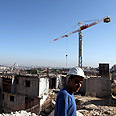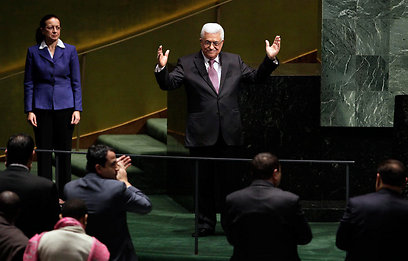
3,000 homes beyond Green Line okayed
Less than 24 hours after General Assembly recognizes Palestine as non-member state, government's top nine ministers respond by approving construction of new housing units in Jerusalem, West Bank. PA: Decision a 'slap in the face of entire world'
In addition, the planning procedures of thousands of additional housing units in Jerusalem and the settlement blocs will be furthered, including in the segment connecting Ma'ale Adumim with Jerusalem, known as the E1 project.
Related stories:
- World coverage: UN says no to US, yes to Palestinians
- 51% of Israelis: Peace with Palestinians unlikely
- Op-ed: UN recognition – no big deal
State officials said Israel was considering further moves in response to the United Nations General Assembly's recognition of Palestine as an observer state.
The decision was made by the government's top nine ministers. A state official said the continuation of construction was done in accordance with the map of Israel's strategic interests.
Palestinian President Mahmoud Abbas' spokesman, Nabil Abu Rudeineh, commented on the Israeli decision, saying that "this declaration is a slap in the face of the entire world which chose to vote in favor of the Palestinian state."
Abu Rudeineh noted that the decision was illegal, adding that "this action will leave Israel even more isolated, after the entire world expressed its objection to the occupation yesterday."
Palestinian negotiator Saeb Erekat condemned Israel's announcement, saying it was "defying the whole international community and insisting on destroying the two-state solution." He said the Palestinian leadership is studying its options.
Hanan Ashrawi, a member of the PLO's Executive Committee, condemned the expansion of Israeli construction beyond the Green Line as well. "This is Israeli aggression against the Palestinian state and the world must take responsibility," she told AFP.
"What was announced today is only part of a comprehensive settlement plan," she said.

Palestinian President Abbas gets warm welcome at UN (Photo: AP)
The American administration criticized the decision as well. State Department Spokeswoman Victoria Nuland said that such actions impeded peace, stressing that direct negotiations were the only solution.
"We're going to be evenhanded in our concern about any actions that are provocative, any actions that make it harder to get these two parties back to the table," she added.
On the eve of the UN vote, the political echelon had planned to practice restraint over the Palestinian move, particularly so as not to make the world turn on Israel, but state officials said that in light of the talk of a diplomatic failure and the fact that the country is in the midst of an election campaign, Prime Minister Benjamin Netanyahu found it difficult to avoid a significant response.
Eventually, the prime minister decided to order a massive construction boom in settlements and Jerusalem neighborhoods located beyond the Green Line.
In earlier discussions on the proper Israeli response to the move, senior sources warned that a decision to build in the settlements would be interpreted by the international community as a measure of punishment against the Palestinians.
They suggested that Netanyahu wait so that the UN vote would not be linked to the decision to build in the settlements, but Netanyahu chose to respond immediately rather than wait.
Canada to review its relationship with PA
The Israeli decision is expected to spark harsh criticism in the international community, particularly the decision to further planning procedures in the segment connecting Ma'ale Adumim and Jerusalem, as this is perceived as an Israeli attempt to prevent territorial continuity within the future Palestinian state.
Israel is not the only country responding to the Palestinian move. Canada's foreign affairs minister is temporarily recalling senior diplomats from Israel, the West Bank and the United Nations missions in New York and Geneva to assess the implications of Thursday's UN General Assembly vote.
John Baird also said Canada would review its whole relationship with the Palestinian Authority.
Baird said he was deeply disappointed by the UN vote, in which Canada joined Israel, the United States and a few other countries in voting "no." He said the only way to peace in the Middle East was through negotiations, not what he called "unilateral actions."
Baird called the General Assembly decision an impediment to peace.
Itamar Eichner is a Ynet and Yedioth Ahronoth correspondent
Elior Levy, Attila Somfalvi, Yitzhak Benhorin, The Associated Press and AFP contributed to this report
- Follow Ynetnews on Facebook and Twitter
- Receive Ynetnews updates directly to your desktop










